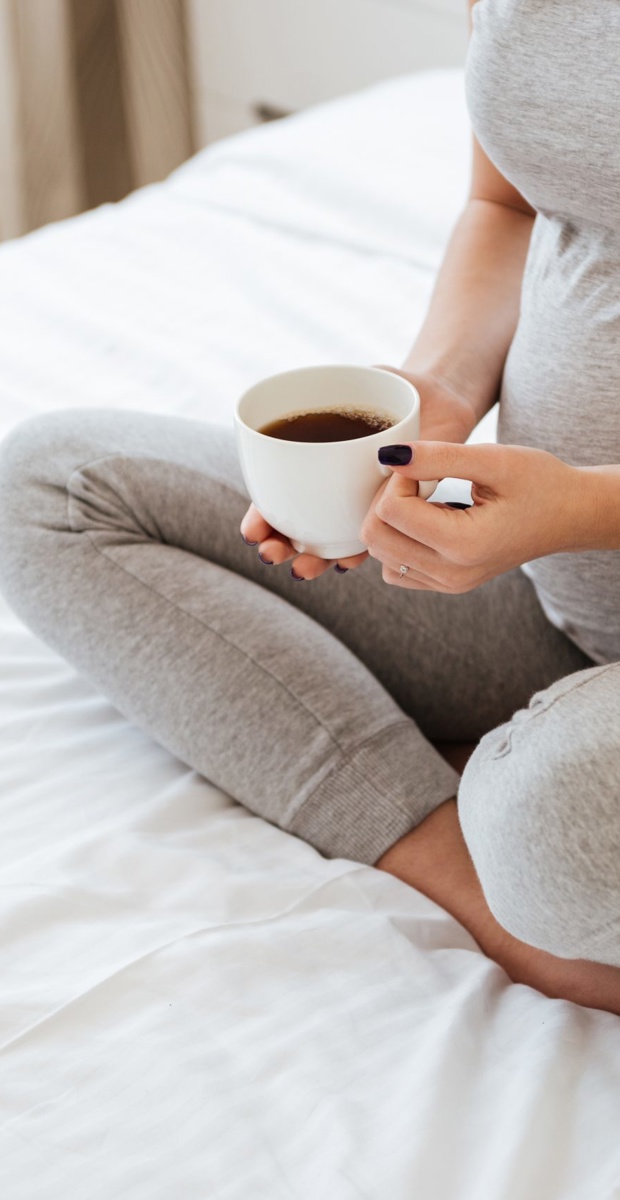No, it is not dangerous to drink coffee during pregnancy. However, Health Canada recommends that pregnant women limit their consumption to 300 mg of caffeine per day.
Caffeine is found in coffee, but also in other drinks and foods. The following table illustrates caffeinated foods and their content.
| Food or beverage |
Portion |
Average caffeine amount (mg) |
| Percolator coffee |
250 ml (1 cup) / 8 oz |
103-200 (~ 118) |
| Filter coffee |
250 ml (1 cup) / 8 oz |
103-200 (~ 179) |
| Instant coffee |
250 ml (1 cup) / 8 oz |
27-173 |
| Decaf coffee |
250 ml (1 cup) / 8 oz |
3-15 |
| Regular mixed tea |
250 ml (1 cup) / 8 oz |
43 |
| Green tea |
250 ml (1 cup) / 8 oz |
30 |
| Tea (leaves or bags) |
250 ml (1 cup) / 8 oz |
50 |
| Espresso coffee |
30 ml / 1 oz |
30-90 |
| Regular soft drink (cola) |
1 can (355ml/12 oz) |
36-46 |
| Sweetened iced tea |
1 can (355 ml/12 oz) |
15-67 |
| Hot chocolate (1 pouch) |
250 ml (1 cup) / 8 oz |
5 |
| Chocolate milk |
250 ml (1 cup) / 8 oz |
8 |
| Milk chocolate |
28 g/1 oz |
7 |
| Dark chocolate |
28 g/1 oz |
3-23 |
The maximum recommended amount of 300 mg of caffeine per day is obtained with, approximately:
- 250 ml of filtered coffee + 2 x 250 ml of tea from teabags + 250 ml of chocolate milk = 287 mg of caffeine.
- 3 x 250 ml of tea from teabags + 250 ml of hot chocolate + 2 oz of milk chocolate + 30 ml espresso = 259 mg of caffeine.
- 250 ml of filtered coffee + 250 ml of green tea + 30 ml of espresso coffee = 299 mg of caffeine.
In other words, 300 mg of caffeine is:
- 2 ½ cups of percolator coffee
- 1 ½ cup of filtered coffee
- 90 ml or 3 espressos
- 6 cups of tea from teabags or leaves
- 60 envelopes of hot chocolate
- 37 cups of chocolate milk
- 42 x 28g of milk chocolate, which is the approximate equivalent of 23 chocolate bars
For more information on caffeine content of various food brand products, click
here and
here.
HAZARD FOR MOTHER AND CHILD
Drinking coffee during pregnancy may present some risks. Caffeine is a stimulant that speeds up the heart rate and can slightly increase blood pressure.
Caffeine can also cause nervousness, headaches, heartburn and may disturb sleep. In addition, beverages and foods containing caffeine also contain compounds called phenols that interfere with
iron absorption.
As pregnancy progresses, the risk of experiencing these side effects increases. The hormonal changes and slow digestion disturb the elimination of caffeine, which is two times slower than normal. This can increase the amount of caffeine crossing the placenta and transmitted to the baby. The latter being in a developing stage, it requires more time to manage and eliminate caffeine. It may also make the baby move more than usual.
Some studies have reported a link between caffeine consumption and the risk of miscarriage. However, these studies were widely criticized and more research is needed to determine the link between caffeine and miscarriage, and to determine the amount that is considered harmful.
For all these reasons, it is strongly recommended to respect the limit of 300 mg of caffeine per day determined by Health Canada.
